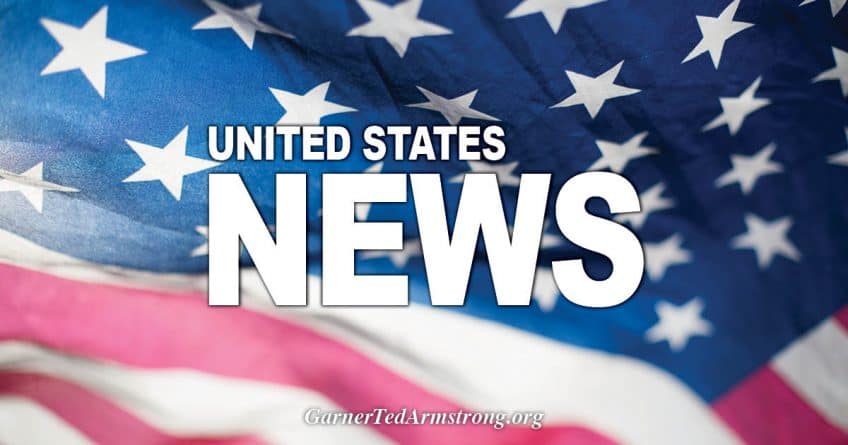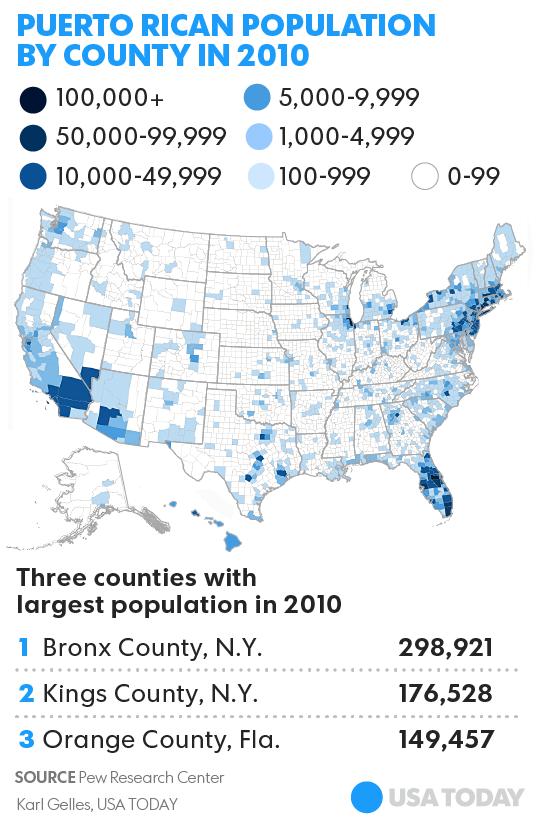It has been a trying week for Satellite Beach resident Erika Rodriguez as she’s continued to reach out to Puerto Rico, hoping to hear from family members struggling in the catastrophic aftermath of Hurricane Maria.
With much of the island without power, short of fuel and with limited access to clean water, Rodriguez wants her family to come to the U.S. mainland while authorities in Puerto Rico try to rebuild power grids, roads and utilities struck by one of the most powerful storms in recorded history, packing sustained winds of 155 mph.
Much like what was seen in days following Hurricane Katrina’s devastating hit on New Orleans, authorities are preparing to absorb evacuees desperate to flee Puerto Rico for shelter with friends and family. That means people could move to places like Central Florida, New York and northern New Jersey – places that are already home to large, flourishing populations of Puerto Ricans – once regular air travel resumes.
However, authorities and advocates alike caution that it’s too early to know how many of the island’s 3.4 million residents will try to leave or just how ready communities in the mainland U.S. are to absorb them.
“We’re trying to find something but there are no flights,” said Rodriguez. Some want to book flights to go to the island to retrieve family members and bring them back to the mainland. “We’re calling around. One of my friends was trying to leave from Orlando and at the last minute the flight was cancelled. They’re also saying that they might be able to get you in but there are no guarantees that we can get you back,” Rodriguez said, referring to reports of limited fuel allocations on the island.
So far, the commercial flights out of Puerto Rico’s main airport in San Juan, have been limited. But that is expected to change.
If migration patterns hold, much of the influx from those escaping the destruction may be to the southern U.S. mainland, where Puerto Ricans have settled over the decades. A Pew Research Center study shows that as the island was in the early throes of its current economic crisis, about 48 percent of people leaving Puerto Rico moved to the South, including 31 percent who relocated to Florida. The reasons? Well-established, tight-knit Puerto Rican communities, family and even the weather. The same may hold true now.
In Orlando — home to Walt Disney World and the hub of Florida’s tourism – more than a million people of Puerto Rican descent live and work along the region’s busy I-4 corridor. Monse Vargas, the president of the non-profit La Casa de Puerto Rico, said preparations must be made for any potential influx of evacuees. That means assisting people leaving Puerto Rico – where nearly half of the population lives below the poverty rate — with temporary housing, job training or other social services.
“There are people who are trying to come. They have family in Central Florida or they’re coming here to buy supplies to take back. But there is a lot of desperation. Some people lost their houses and want to get out, even though right now it is extremely difficult,” Vargas said.
That may include a new start for some or a temporary stay, she said. Either way, said Vargas, the numbers of those migrating to the mainland is likely to be large.
Puerto Rico native Israel Suarez, pastor and founder of the Nations Association, a non-profit that provides programs for at-risk youth in Fort Myers, Florida, said there is an abundance of work waiting on new arrivals.
“So they are looking for ways to have a steady job,” Suarez said. “If they find out how good Fort Myers is – we have a lot of job opportunities now. The economy is growing. You’ve seen how Fort Myers is growing in jobs. There are opportunities here. And education.
“Let me put it to you this way. Puerto Rico, my friend, is destroyed. Puerto Rico is in bad shape. And you know that Puerto Rico has been bankrupt. Puerto Rico owes a lot of money to the federal government. All of the businesses are gone. So right now, you’re going to have more people without jobs. They are going to have to do something.”
Jackie Cruz of Port St. Lucie, Florida, said she is more than willing to help bring all of her family — including her mother, aunt, sister, her husband’s children, grandchildren and others — to the mainland.
“We’re all trying to get together with my sister in Jersey to figure out how we can bring them here. They won’t leave anyone behind,” Cruz said. “We’re trying to convince them being here is better than being where they are. They don’t know anything outside of Puerto Rico.”
States respond
Officials in several states were readying resources. In Florida, Gov. Rick Scott has asked the state’s public colleges and universities to allow students displaced by the storm in Puerto Rico to pay tuition at an in-state rate.
Florida will assist with “whatever is needed, both in Puerto Rico and in Florida,” said Kerri Wyland, a spokeswoman for Scott.
“Last week, I also had the opportunity to meet with Puerto Rican evacuees at Florida International University’s shelter and I was moved by their stories of strength and their determination to quickly return to and repair their homes. Their resilience after this tragedy is an inspiration to us all and Florida is proud to stand with Puerto Rico during this challenging time,” Scott said in a statement.
New Jersey, which sent a task force and resources to Florida, South Carolina and Texas in response to hurricanes earlier this month, is preparing to send aid to Puerto Rico.
Gov. Chris Christie’s office said the administration is “on standby,” waiting to hear from the Federal Emergency Management Agency what Puerto Rico needs and, if resources are needed, where they must go.
Public school systems in several states are also bracing for an influx of students from Puerto Rico, where Spanish remains a primary language.
“Principals have been made aware students may be coming, have been given procedures for enrolling these students in the absence of records, and have been provided guidance to refer to the student progression plan for their placement,” Jennifer Wolfinger, a spokeswoman for Brevard County Public Schools. So far, it is not known how many students from the U.S. territory might be coming.
Desperation grows
Food, clean water and fuel – from gasoline to jet fuel – is scarce on the island. And while there is no shortage of people – including private citizens – who want to fly in with personal supplies for their families or communities on the island, the logistics have been daunting. At one point, Royal Caribbean was planning to use the Adventure of the Sea cruise ship to drop off relief supplies and evacuate employee’s families and other stranded tourists from San Juan. Those plans, however, were cancelled today. There are roads that remain impassible because of the damage. Some communities on the island are so remote they are only accessible by helicopter. Loved ones living stateside are worried.
Janice Rivera said she feels helpless as she watches the images on television of the devastation in Puerto Rico. Rivera, of Rockaway, New Jersey, said her brother and sister live in the municipality of Cedra, located in the middle of the island. She recently received a text that family members sometimes eat fruits that have fallen from trees, including plantains, bananas and avocados.
She said one of her nephews lost the zinc roof of his home, and that she’s worried about the scarcity of food. She said she can’t even send cash to her family through the bank because they can’t access money.
“They say it will take two months for power to come back, and we worry about what they are going to eat,’’ she said. “What are they going to do, and if they are flooded where are they going to live.”
At the island’s primary airport in San Juan, hundreds of people pack terminals just waiting for any chance to catch a flight out.
“The question that has come up was can we fly planes to Puerto Rico,” said Lori Booker, spokeswoman for the Orlando Melbourne International Airport, situated in Central Florida. “The answer is yes, but the fuel we would need once we get there is being reserved for the government-related relief agencies is my understanding,” Booker said.
At the Orlando International Airport in Orange County, there were two passenger flights – one arriving and one departing for Puerto Rico – scheduled Wednesday.
Normally, there are about 26 flights a day between Orlando International and Puerto Rico, said airport spokesman Rod Johnson.
“Today, we are receiving one flight. Why? That is something that’s up to the airlines. They determine their flight schedules. We do have eight relief flights going out, but that’s it,” he said.
For days, Denisse Caruth of Little Falls, New Jersey, and her brothers, have been calling airlines to find out how quickly they can get their 80-year-old father on a plane to the states. She said her father, who takes blood pressure medication, lived in the United States before moving back to the island more than 35 years ago. She said her family had tried to convince their father to come to the mainland for the past few years, but he had resisted until now.
“He has agreed to come,’’ said Caruth. “I don’t think he should be living there. They are suffering in the hospital, and their health care system is suffering, and for health care purposes it scares me, they are not equipped by any means at this moment.”
Private flights
Faced with images of people waiting in long lines without air conditioning at San Juan’s airport and a lack of communications, some families are taking efforts into their own hands.
One famiIy, fled the aftermath of the storm on a private plane to Fort Myers, Florida, with a dozen people and a dozen dogs hoping to stay at least a month in the Sunshine State.
Denisse Quinones, 45 and a Cape Coral, Florida, hairdresser for 15 years, drove to Fort Lauderdale on Wednesday to pick up her mother and grandmother. They will join her in a two-bedroom house along with her three children for the next three-to-six months in the Sunshine state.
“I booked them an airplane while the hurricane was going on,” Quinones said.
“I just kept calling and calling until finally it happened. But not everyone has that discipline or luxury of being able to do that. I do know others who are coming. They are not retired. They live paycheck to paycheck. They already are struggling. They are trying to get out. They probably will be here. That’s going to be an impact for the community. They’re going to need jobs and assistance and housing. How are we going to accommodate all of that?”
“This is a humanitarian crisis.”
President Trump is expected to visit the storm-battered island next Tuesday.
For Wanda Ortiz of Passaic, New Jersey, the president’s scheduled visit is too late. She lauded New York Governor Andrew Cuomo who visited the island on Friday and delivered supplies.
“If it was another president, he would have been there already to look at the damage,’’ said Ortiz, whose father and siblings live on the island. “The governor of New York went, he was there first, and he’s not the president.”
Ortiz said she hadn’t spoken to her father yet, but said she got word from a nephew that he was doing well and that his house was not damaged.
She said her father would never leave the island, although the thought has crossed her mind.
George Andreassi II, David Dorsey, and Monsy Alvarado, contributed to this report.
Source: http://www.floridatoday.com/story/news/2017/09/28/evacuees-puerto-rico/709409001/
[Disclaimer]











